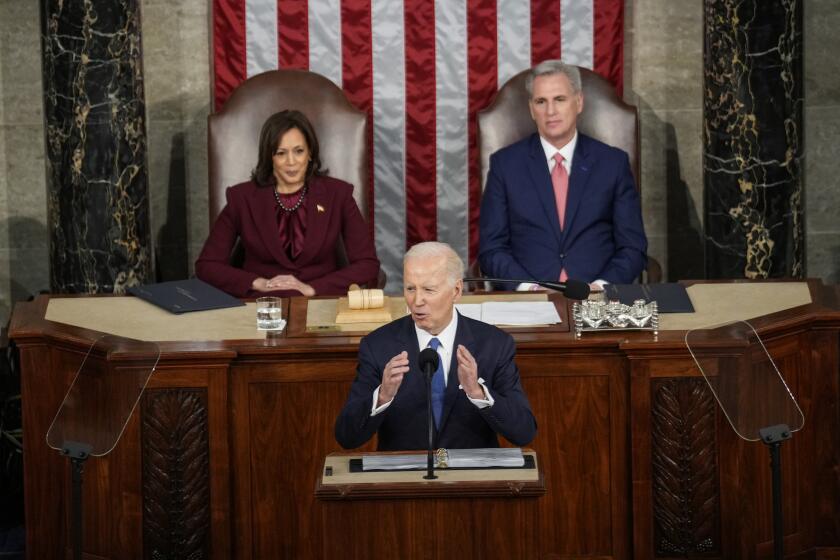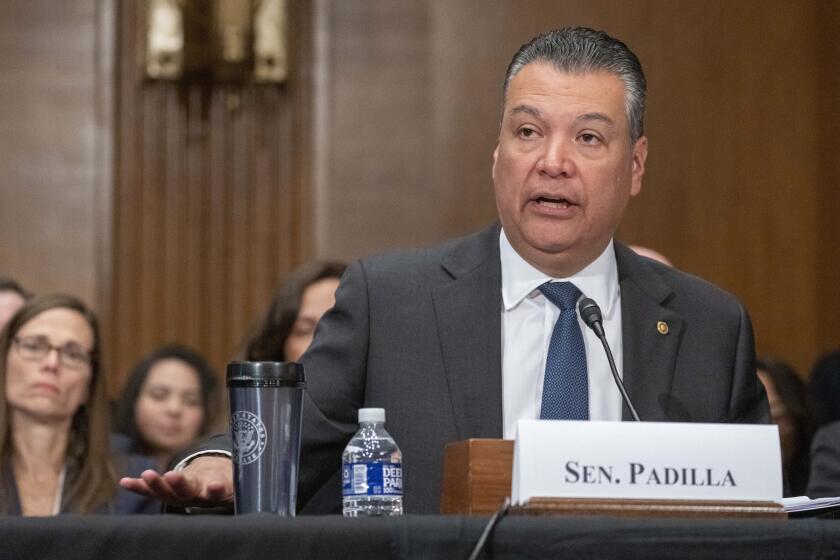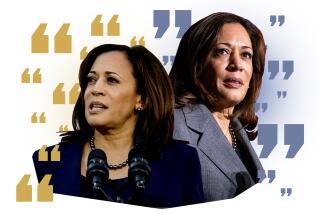Border security could sway some California Democrats — and control of Congress

WASHINGTON — The Republican effort to solidify immigration as a decisive issue in the November election promises to influence the rematch between President Biden and former President Trump, and has already intensified the pressure on swing-district Democrats as their party fights to win control of Congress.
Seeking a political advantage, Trump continues to hammer Biden over his administration’s border policies and stoke anti-immigrant sentiment — vowing mass deportations of people residing in the country illegally, dehumanizing them as “animals” and accusing them of “poisoning” communities.
Biden has adopted a stricter tone in recent months as he urges House Republicans to pass a bipartisan border security bill, saying he would shut down the border immediately if given the chance.
The bill itself marks the first time most Democrats in Congress have supported immigration legislation without a provision for people to seek legal status.
A Border Patrol agent from New York, an immigrant rights activist from Chicago and DACA recipients from California are among those expected at the president’s address.
The same theme is playing out down the ballot, as some Democrats grow more outspoken about their support for stronger border security and harsher immigration policies.
Thirty-seven Democrats voted this month for the Laken Riley Act, which would require the Homeland Security Department to detain immigrants who are arrested on suspicion of theft-related crimes. A week later, 14 Democrats voted for a resolution “denouncing the Biden administration’s open-borders policies.”
The votes could reflect how Democrats in vulnerable congressional seats might stave off attacks from opponents who say they’re soft on the issues of immigration and the border.
Chris Tausanovitch, a political science professor at UCLA who studies Congress, said Republicans had designed recent immigration-related bills to win over politically vulnerable Democrats — forcing some to condemn a president from their own party.
“We know the situation at the border has changed massively,” he said. “Border security has always been popular among the American public. Politically, that is a smart swing-seat stance.”
Senate Democrats, who hold a slim majority, immediately blocked the Laken Riley Act from moving forward. Tausanovitch said that some House Democrats who voted for it might have voted differently if the measure had stood a chance of becoming law.
“The fact that these bills do not have a chance of passing makes it a political win-win for a moderate Democrat who wants to show that they really have a harsh stance on immigration,” he said.
But House Republicans, who last month blocked a bipartisan Senate border security bill at Trump’s behest, have put forward bills that are tangentially related but not exactly about border security, and that are unpalatable to most of those to their left.
Tausanovitch said that’s because Republicans want to show voters they are trying while still remaining loyal to their presidential candidate’s wishes.
For the record:
2:37 p.m. March 25, 2024An earlier version of this post said that Josh Harder resides in Turlock, Calif. He resides in Tracy.
Reps. Mike Levin of San Juan Capistrano and Josh Harder of Tracy were among the California Democrats who voted for the Laken Riley Act. Though both incumbents are favored to win reelection in November, Levin’s district in Orange and San Diego counties is almost evenly divided among Democratic and Republican voters, and Harder faces a challenge from Stockton’s Republican mayor, Kevin Lincoln, in his Central Valley district.
The Laken Riley Act was named for a Georgia college student who was slain last month. Police have arrested a suspect in her death who reportedly entered the U.S. unlawfully in 2022 and was released inside the country by Border Patrol. The bill would also allow states to sue the federal government over alleged failures related to immigration enforcement.
House Speaker Mike Johnson (R-La.) immediately condemned the 170 Democrats who voted against the bill.
“Sadly, if these Democrats have their way, there will be more victims like Laken Riley,” he said on the social media platform X.
Riley’s father said this week that it angers him to see her death being exploited for political gain.
After casting his vote in favor of the GOP measure, Levin released a statement saying he believes everyone should abide by the rule of law.
“While I voted for this bill, I do not agree with its language that injects politics into legislative text and wrongfully singles out the Biden administration for Ms. Riley’s murder,” he wrote.
Levin is among a group of 26 House Democrats who formed the Democrats for Border Security Task Force this month. Led by Reps. Henry Cuellar of Texas and Tom Suozzi of New York, the group aims to address a surge in illicit narcotics and irregular migration at the southern border.
Suozzi, who replaced the expelled former Republican Rep. George Santos last month, campaigned on tightening border security and pushing for bipartisan immigration reform that will “treat people like human beings.”
Sen. Christopher S. Murphy of Connecticut urged his Democratic colleagues in a memo last month to emphasize the border and immigration, saying Suozzi’s win could “serve as a roadmap for Democrats.”
Rep. Susie Lee of Nevada, who also voted for the resolution condemning Biden’s policies and for the Laken Riley Act, said she had always been strong on border security, a top issue in her district. But local advocates slammed her vote for the resolution on border policies, calling it a disappointing misstep.
“Do these resolutions have language that I don’t 100% support? Absolutely,” Lee said in response. “But the fact of the matter is it’s not just our border security. We obviously need to have a border and respect that border, but more importantly we need to reform our immigration system. This is something that Congress has failed to do for the last 30 years.”
Lee said she disliked that the Riley act was written in such a partisan way. But she said bipartisanship means neither side gets exactly what it wants.
“You should start and negotiate from where you can find common ground,” she said. “But too often, especially when it comes to immigration reform, so many times the conversation starts at the red line.”
Whether or not a bill will pass, Lee said, she always votes based on what is in front of her.
Democratic strategist Maria Cardona said Democrats have reached a turning point. Republicans “turning their back on the border bill” gave Democrats an opening to go on the offensive, she said.
A bipartisan group of senators had worked for months to craft the $118-billion border security and foreign aid bill. Members of the Congressional Hispanic Caucus, furious they were left out of the negotiations, opposed its wishlist of GOP immigration priorities, including raising the threshold for asylum seekers and curbing presidential authority to parole migrants who face persecution in their home countries.
But the legislation fell apart after Trump told Republicans not to support it.
Padilla says border state Democrats weren’t part of negotiating the immigration bill, which he says makes extreme changes to the asylum process.
Instead of playing on Republican turf, Cardona said, Democrats need to use this moment to define, in detail, their immigration solutions — broadly speaking, a balanced approach coupling increased security measures with expanded legal pathways for immigrants. Democrats previously left a vacuum open by not talking about the issue enough, she said. Now they’re speaking out.
“When there’s a vacuum, it’s going to be filled with misinformation,” she said. “If you don’t define yourself, your opponent is going to define you. It’s the first rule of politics.”
Kerri Talbot, executive director of the advocacy group Immigration Hub who works with Congress to develop policy, said it was disappointing to see Democrats vote with Republicans for the Laken Riley Act.
“There’s a cost to Trump focusing all of his energy on this issue,” she said. “He’s got a big bully pulpit.”
More to Read
Get the L.A. Times Politics newsletter
Deeply reported insights into legislation, politics and policy from Sacramento, Washington and beyond. In your inbox three times per week.
You may occasionally receive promotional content from the Los Angeles Times.













